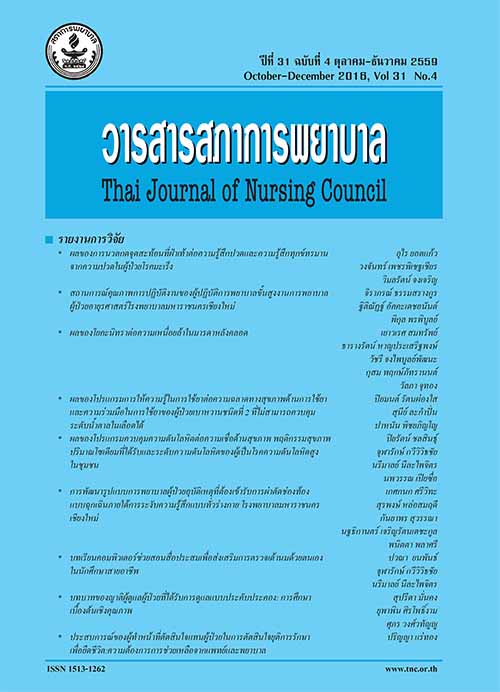ประสบการณ์ของผู้ทำหน้าที่ตัดสินใจแทนผู้ป่วยในการตัดสินใจยุติการรักษาเพื่อยืดชีวิต: ความต้องการการช่วยเหลือจากแพทย์และพยาบาล; Experience of Surrogate Decision Makers in Withdrawing Life-Sustaining Treatment: Types of Help Needed from Physicians and Nurse
Keywords:
ประสบการณ์, ผู้ทำหน้าที่ตัดสินใจแทนผู้ป่วย, การตัดสินใจยุติการรักษา, เพื่อยืดชีวิต, ผู้ป่วยระยะท้ายความต้องการการช่วยเหลือจากแพทย์และพยาบาล, experience, surrogate decision makers, decision to withdraw life-sustaining treatment, terminally ill patientsAbstract
บทคัดย่อ : วัตถุประสงค์ของการวิจัย : เพื่อศึกษำประสบกำรณ์ของผู้ทำหน้าที่ตัดสินใจแทนผู้ป่วย
ในการยุติการรักษาเพื่อยืดชีวิตผู้ป่วยระยะท้าย ด้านความต้องการการช่วยเหลือจากแพทย์
และพยาบาล
การออกแบบวิจัย : การวิจัยคุณภาพเชิงปรากฏการณ์วิทยา
วิธีดำเนินการวิจัย : ผู้ให้ข้อมูลเป็นผู้ที่ทำหน้าที่ตัดสินใจแทนผู้ป่วยในการยุติการรักษาเพื่อยืดชีวิตผู้ป่วยระยะท้ายที่เข้ารักษาในหอผู้ป่วย โรงพยาบาลธรรมศาสตร์เฉลิมพระเกียรติ
จำนวน 13 ราย คัดเลือกผู้ให้ข้อมูลหลักแบบเฉพำะเจาะจง เก็บรวบรวมข้อมูลโดยการสัมภำษณ์เชิงลึก วิเคราะห์ข้อมูลเชิงเนื้อหาตามหลักการของโคไลซี
ผลการวิจัย : ประสบกำรณ์ของผู้ทำหน้าที่ตัดสินใจแทนผู้ป่วยในการยุติการรักษาเพื่อยืดชีวิตผู้ป่วยระยะท้าย ด้านควำมต้องการการช่วยเหลือจากแพทย์และพยาบาล ประกอบด้วย
ประเด็นดังนี้ 1) ข้อมูลและการให้คำปรึกษา โดยมีประเด็นย่อยคือ 1.1) ข้อมูลชัดเจน เพียงพอและต่อเนื่อง 1.2) การเปิดโอกาสให้ซักถามและได้รับคำตอบในสิ่งที่สงสัย 1.3) การพูด
สะท้อนคิดเพื่อให้ตัดสินใจได้ด้วยตนเอง 2) การยืดหยุ่นเวลาเยี่ยมเพื่อให้มีส่วนร่วมดูแล 3) การช่วยดูแลผู้ป่วยให้ดีที่สุด โดยมีประเด็นย่อยคือ 3.1) สุขสบายทั้งกายใจ ไม่เจ็บปวด
ทุกข์ทรมาน 3.2) เคารพในศักดิ์ศรีความเป็นมนุษย์ 3.3) ตายดี จิตวิญญาณสู่สุขคติภูมิ
ข้อเสนอแนะ : ผลกำรวิจัย สำมำรถนำมาใช้ประโยชน์สำหรับบุคลากรทีมสุขภาพ เพื่อใช้ในพัฒนาระบบการดูแลผู้ป่วยแบบประคับประคอง ด้านการวางแผนเตรียมความพร้อมของ
ผู้ที่ทำหน้าที่ตัดสินใจแทนผู้ป่วยในการตัดสินใจเพื่อยุติการรักษาเพื่อยืดชีวิตผู้ป่วยระยะท้ำยที่สอดคล้องกับความต้องการของผู้รับบริการ รวมทั้งนำมาใช้ในการจัดเรียนการสอนเพื่อช่วย
ให้นักศึกษาแพทย์และนักศึกษาพยาบาลให้เกิดควำมเข้าใจและรับรู้ถึงความรู้สึกแท้จริงที่เกิดขึ้นตำมปรากฏการณ์อย่างลึกซึ้งต่อไป
Abstract: Objective: To study surrogate decision makers’ types of help needed from
physicians and nurses in the process of deciding to withdraw life-sustaining treatment.
Design: Qualitative Husserlian phenomenological research.
Implementation: This study was conducted on 13 purposively sampled informants
who were surrogate decision makers for terminally ill patients treated in the in-patient
ward of Thammasat University Hospital. Data were collected by means of in-depth
interviews and analysed based on Collaizi’s content analysis principles.
Results: In the surrogate decision makers’ experience, their need for physicians’
and nurses’ help in the process of deciding to withdraw life-sustaining treatment was
classifed into 3 major types. The frst type of help needed concerned information and
consultation. In this respect, their expectations included (1) clear, suffcient and continual
information; (2) opportunities to ask questions and receive answers about matters in
which they sought clarifcation; and (3) thought-provoking suggestions that facilitated
self-decision making. The second type of help the informants needed was greater flexibility
for visit periods, so that they could spend more time taking care of their relatives. The fnal
type of help expected by the informants was the best care for the patients, which concerned
(1) physical and mental wellbeing, and absence of pain and suffering; (2) respect for
the patients’ dignity as human beings; and (3) peaceful deaths and spiritual rest.
Recommendations: The fndings could be applied by healthcare personnel to
developing an effective palliative care system, to planning a need-based method of
readying surrogate decision makers for the withdrawal of life-sustaining treatment from
terminally ill patients, and to designing teaching/learning activities to enable medical
and nursing students to have a profound understanding and perception of this phenomenon
and any feelings associated with it








